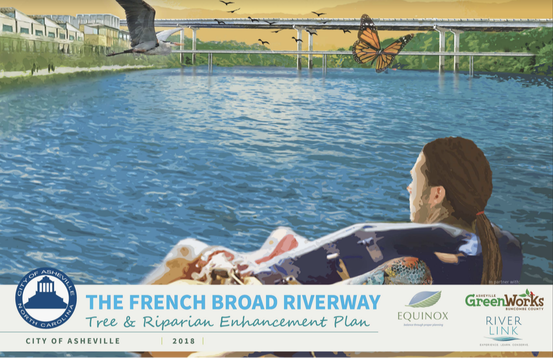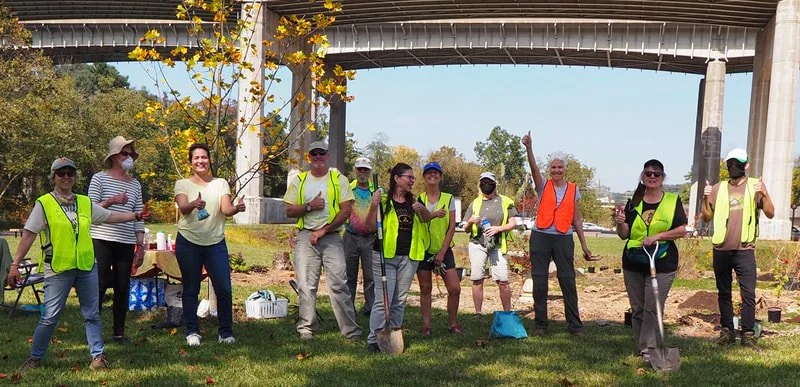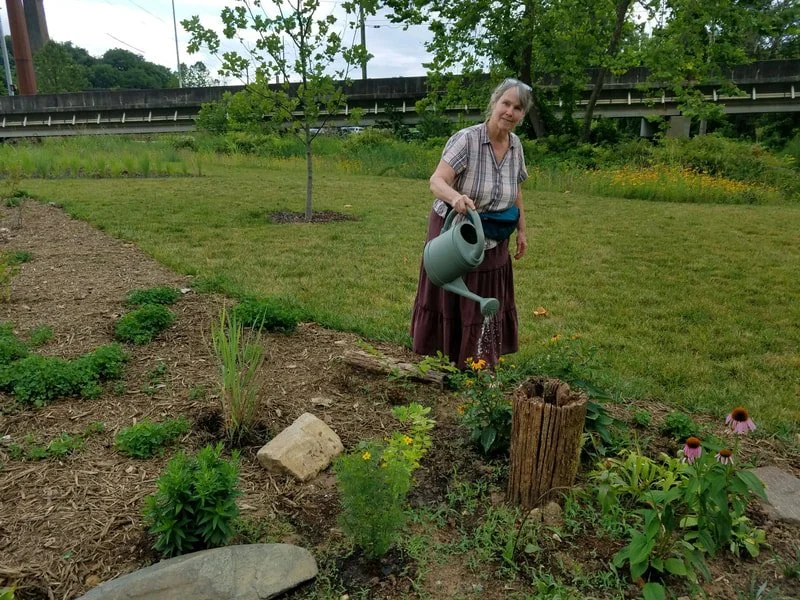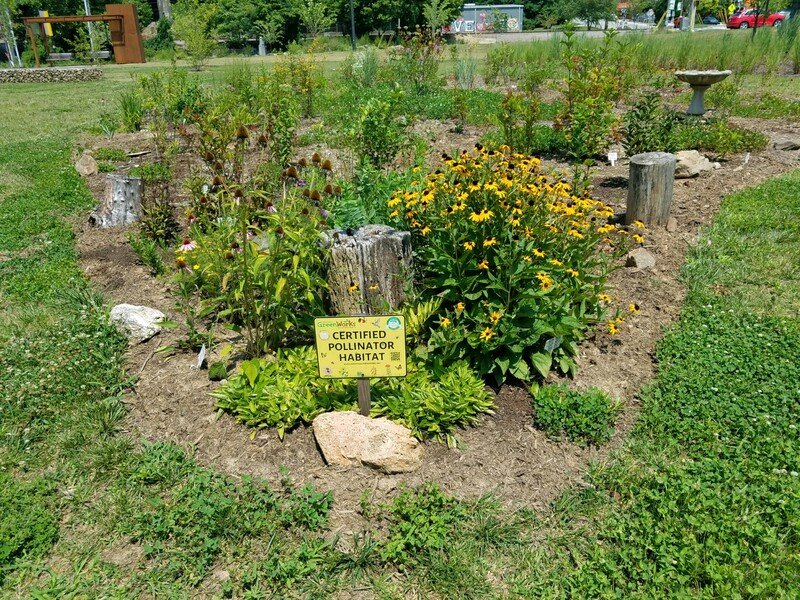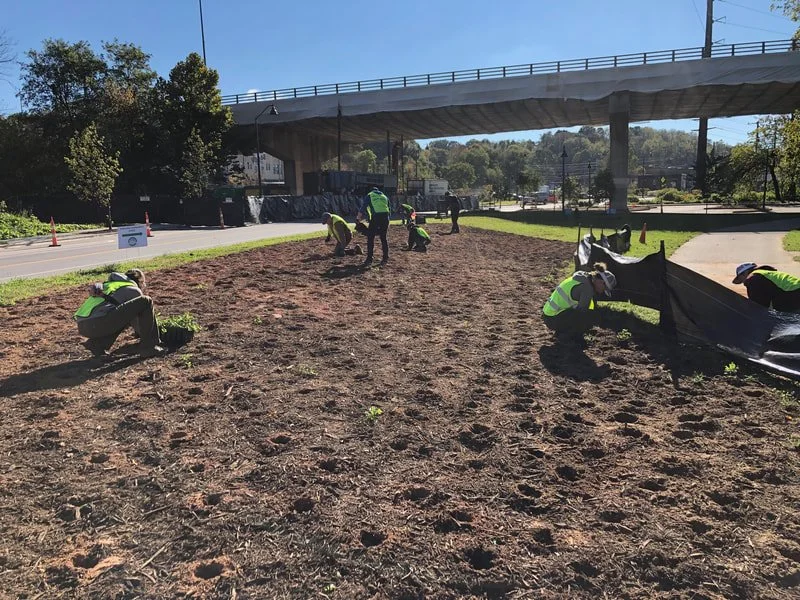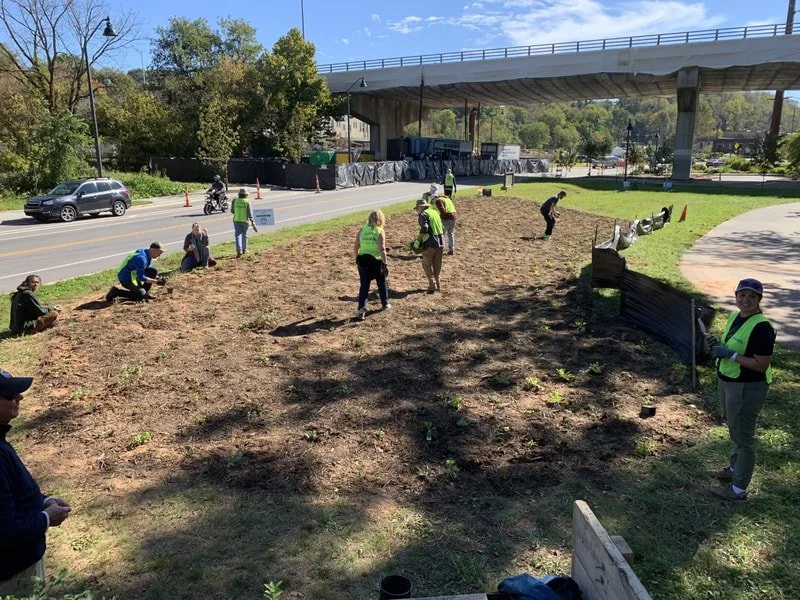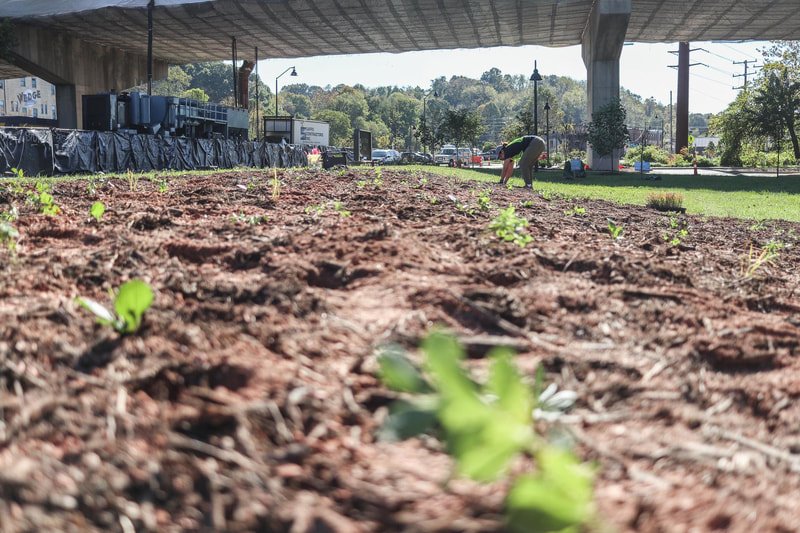Pollinator Gardens & Meadows Project
Project Background
Updated August 30, 2023: The following two case studies involved years of work by GreenWorks and Bee City USA Asheville volunteers with several departments in the City of Asheville to obtain the necessary approvals for planting on city-owned property. The projects also involve ongoing fundraising efforts for the maintenance of the two properties. Projects on this scale require the approval and participation of a partner organization, like GreenWorks, that can provide support with liability insurance, volunteer coordination and possibly fundraising.
The project will take place in Asheville, Buncombe County, along a section of the Wilma Dykeman Riverway that runs through the highly urbanized River Arts District on the banks of the French Broad River. As recently as 2018, the project area was characterized by remnants of its industrialized past – concrete pads and rusted car chassis left from auto salvage yards, dilapidated tobacco storage barns, large swaths of invasive plants and unauthorized camp sites filled with trash and discarded hypodermic needles.
In 2018, the City of Asheville commissioned Equinox, a local environmental consulting firm, to draft the French Broad Riverway Tree and Riparian Enhancement Plan for this section of the Wilma Dykeman Riverway. The plan aimed to propose a plan of action for improving water quality, increasing tree canopy and educating others about the importance of the ecology on this stretch of the French Broad River. Included in the plan is the establishment of pollinator meadows and pocket gardens to provide habitat for a host of species, as well as offer other benefits such as stormwater management and erosion control.
The proposed plan offers Asheville the opportunity for the first demonstration project of a native pollinator meadow along the Wilma Dykeman Riverway. When strung together, areas planted in wildlife-friendly native plants create a contiguous corridor of oases for pollinators and birds, places to find food, if not also nesting and overwintering sites. No habitat is more ideal for creating wildlife corridors than natural riparian areas along rivers and creeks.
Bees, birds, butterflies, beetles and other creatures are all pollinators responsible for the majority of the food we eat and the reproduction of the plants around us. Pollinators are in rapid decline due to loss of feeding and nesting habitat. Pollution, pesticides and climate change are also having a negative impact on pollinator habitat and the species they support. Planting large swaths of pollinator habitat along the French Broad River has some of the highest benefit as it serves as a migration corridor for many pollinator species.
Because of budget constraints, much of the FBR Tree and Riparian Enhancement Plan does not have the funding to be implemented. Public-private partnerships and funding are essential to the pollinator meadow and garden project to move forward. GreenWorks is working in partnership with the City of Asheville to secure funding and coordinate donations of materials and volunteer labor to establish pollinator gardens and meadows as intended in the plan.
Project Progress
River Arts District Pollinator Habitat (RAD HAB)
The RAD HAB began in 2020 with two projects for the Blue Ridge Naturalist Certification through the NC Arboretum. GreenWorks’ board member, Rich Patiño created the first of seven Pollinator Gardens and Meadows to be built by community organizations along the Wilma Dykeman Greenway. He and several volunteers prepared a site and began planting shrubs, grasses, and perennials in May 2020.
The torch was then passed to Betsy Savely, who upgraded the habitat using Asheville GreenWorks' Bee City guidelines for Pollinator Habitat Certification. By July 2020, she had planted almost 30 more native perennials, naturalized the site, and certified the habitat.
The GreenWorks Bee City - Asheville Leadership Committee embrace the care and continuation of the site by planting, watering, and weeding the garden.
In October 2020, the RAD HAB got a big boost when Bill Jones, Bee City committee member and owner of Carolina Native Nursery, hosted a workday for which he would donate over 100 perennials and two staff members to assist. Reems Creek Nursery donated soil, and GreenWorks provided tools, vests, and staff support. A group of eleven volunteers including Betsy Savely, Rebecca Robertson, Heather Rayburn, Florrie Funk, Greta Lee Camp, Teri Lechner, Peter Menzies, Rich Patiño, Rebecca Robertson, Phyllis Stiles, and Sarah Tarpley planted 120 perennials in less than two hours!
Today, the Bee City-Asheville committee and volunteers continue to maintain the site, donating over 100 hours of time in 2021 alone. They have mulched and planted the area with 29 native shrubs of 13 different species, and almost 200 native perennials of 30 different species.
RAD Pollinator Meadow
Private donations from individuals, fundraising events and sponsorships from the GreenWorks' Bee City USA Asheville Leadership Committee, and grant funding from Pine Gate Renewables and the Blue Ridge National Heritage Area support the installation of the pollinator meadow and educational signage.
In October 2021, under the guidance of biologist Bryan Tompkins of the U.S. Fish & Wildlife Service, GreenWorks volunteers and staff prepared the 2,000 sq. ft. site for planting by removing exotic plants and turf grass with a sod cutter. Volunteers then planted 1,400 native pollinator flowering perennials and grasses for a natural riparian meadow appearance on the Wilma Dykeman Greenway, just north of Jean Webb Park.
With over thirty different species of plants, this habitat will support many kinds of pollinators throughout their life cycles. The RAD Pollinator Meadow is transforming a once polluted, desolate landscape into a beautiful, lively ecosystem. Permanent signage will explain the choice of plant species, the relationship between pollinators and plants, the role of larval host plants for butterflies and moths, and the importance of milkweed to reversing the decline of monarchs.




